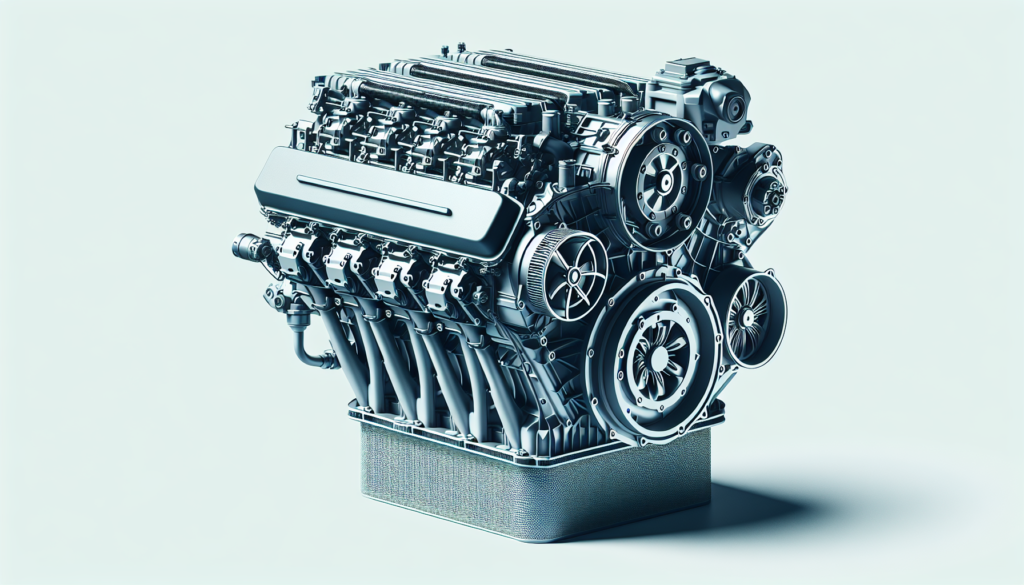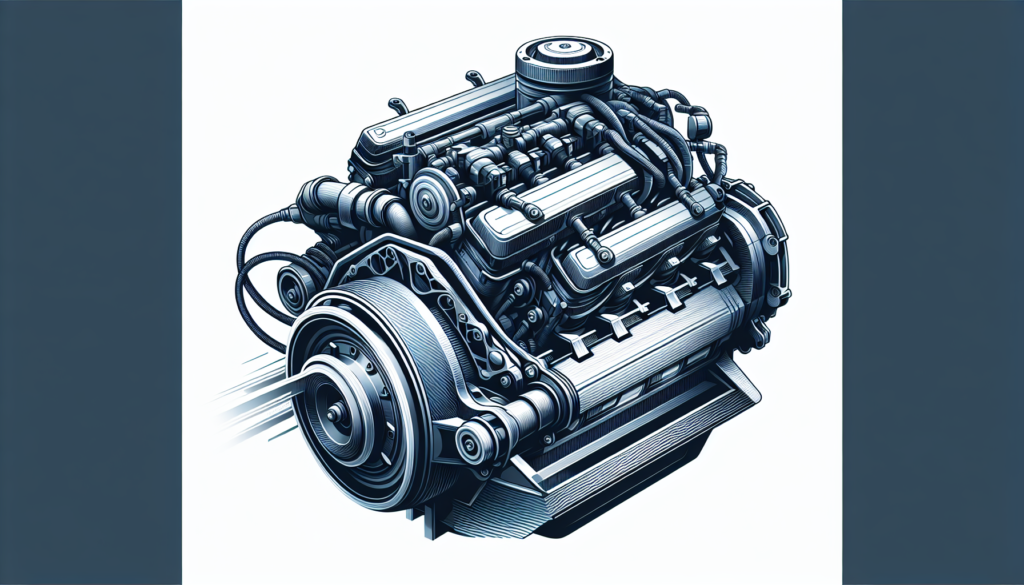Imagine this: You’re smoothly cruising through indigo waters under a cloudless sky, your boat performing impeccably with an advanced fuel-efficient engine. It’s no longer just a dream, as the marine industry is making significant strides in enhancing boat engine fuel efficiency. Through this article, you’ll get to explore the most recent innovations that have brought revolutionary changes to boat engine fuel efficiency. These advancements are not just providing a smoother ride but also reducing the carbon footprint and fuel consumption, making your marine ventures more sustainable and environmentally friendly.

Changing Market for Boat Engines
Just like almost every other industry, the market for boat engines is currently going through a significant transformation. Fuel efficiency and eco-friendliness have become the new buzzwords and yacht builders, manufacturers and boaters alike are increasingly looking at ways to minimize their carbon footprint. This shift towards greener marine technology comes as a result of increasing awareness about our effect on the environment, but also a desire to reduce fuel costs that have a substantial impact on the operating costs.
Shift towards more Eco-friendly Engines
You might have noticed that the boat engine industry is gradually moving towards more eco-friendly engine technologies. This means engines that leave a smaller carbon footprint by using greener technologies like electricity and hydrogen fuel cells. The switch towards greener engines is not just about being more environmentally responsible; it’s also about saving money in fuel costs.
Demand for Greater Fuel Efficiency
But why is there such a large demand for greater fuel efficiency in boat engines? The answer is simple – cost. Fuel is one of the biggest operational costs for any boat owner. Therefore, the more fuel-efficient a boat engine is, the less it will cost to run, making higher efficiency a major selling point.
Advancements in Diesel Engine Technology
Even traditional petrol and diesel engines are not being left behind. New technologies are leading to significant improvements in how these engines perform. These innovations aim to provide cleaner, cheaper and more efficient power.
Improved Fuel Injection Systems
One of the most noticeable advancements in diesel engine technology comes in the form of improved fuel injection systems. Diesel engines are now using ultra-high-pressure common rail fuel injection systems that provide cleaner combustion, more torque, less noise and better fuel efficiency.
Variable Valve Timing (VVT)
Variable Valve Timing (VVT) is another key advancement in diesel engine technology. VVT essentially allows the engine to optimize its intake and exhaust valve opening times according to the current load and speed. This leads to increased power and torque, improved fuel economy and reduced emissions.
Turbocharging and Supercharging
Then there are innovations like turbocharging and supercharging. The major advantage of these technologies is that they allow smaller engines to generate more power and torque, therefore enhancing efficiency whilst at the same time decreasing fuel consumption.
Electric Propulsion Engines
This is the age of electric vehicles and boats are no exception. Electric propulsion engines are becoming increasingly popular, promising zero emissions and quiet operation.
Hybrid Electric Boat Engines
Today, more boat manufacturers are offering hybrid electric engines, which combine an internal combustion engine with an electric motor. These engines offer the flexibility to utilize either source of power depending on the situation — the electric motor for quiet and emission-free operation at lower speeds, and the combustion engine for higher speeds.
Full Electric Boat Engines
There is also a rise in the use of full electric boat engines. These engines use electric motors powered by sizable battery banks. Increased development and research into batteries means higher ranges and better performance for electric boat engines.
Advantages and Challenges of Electric Engines
The major advantage of electric engines is their eco-friendliness – they emit zero carbon emissions. They’re also quiet and require less maintenance. However, they come with their share of challenges, such as limited range and long charging times.

Fuel Cell Technology in Boating
Fuel cell technology is another promising development in the boating industry. Unlike traditional combustion engines that burn fuel, fuel cell engines generate electricity through a chemical reaction between hydrogen and oxygen.
Principle of Fuel Cell Engines
In a fuel cell engine, hydrogen and oxygen combine to produce electricity and water. There’s no burning or combustion involved, which means significantly less pollution and better efficiency compared to traditional engines.
Benefits of Hydrogen Fuel Cells
One of the main benefits of hydrogen fuel cells is their efficiency. They convert chemical energy directly into electrical energy, bypassing the inefficiencies of combustion. They also emit zero greenhouse gases, making them a very green choice.
Limitations of Fuel Cell Technology
Despite these benefits, fuel cell technology still faces certain limitations. One is the lack of a comprehensive hydrogen infrastructure. Hydrogen is also relatively expensive compared to other fuels and there are also safety concerns due to the high flammability of hydrogen.
Solar Power in Marine Applications
Solar power is another green technology that’s making headway in the boating industry. With advancements in solar panel efficiency and battery storage, solar-powered boats are no longer a pipe dream.
Solar Panels on Boats
Many boat owners are now installing solar panels on their boats. These panels can power everything on the boat, from the engine to the appliances, meaning zero fuel costs and zero emissions.
Solar Electric Propulsion
Solar electric propulsion is becoming a viable option for some boaters. Solar panels charge batteries, which then power an electric motor. This means quieter and more eco-friendly boating.
Efficiency and Limitations of Solar Power
Solar power is free and abundant and can be used to power everything on a boat. However, it is also subject to weather conditions and seasonal changes. Additionally, even the most efficient solar panels are still relatively large and heavy, making them less suited for smaller boats.
Nuclear Powered Boats
Nuclear power has been used in naval submarines and icebreakers for decades, due to its ability to provide power for long durations without refueling. However, its use in commercial or leisure vessels is still a topic of debate due to safety and cost issues.
Principles of Nuclear Propulsion
Nuclear propulsion involves the use of nuclear reactors to heat water, producing steam that drives the turbines hooked to the propellers, thus moving the boat.
Applications and Limitations
While nuclear power can power boats for years without refueling, it remains largely confined to military use due to high costs and potential safety risks.
Safety Concerns for Nuclear Boats
Nuclear power may provide incredible endurance, but it comes with a set of unique safety concerns. Nuclear accidents can cause radiation leakage, making it a risky proposition for commercial or leisure use.
Improvements in Propeller Design
There have even been leaps in propeller design aimed at boosting fuel efficiency. These improvements focus on optimizing propeller shape, size and material.
Efficiency Gains from Propeller Innovations
Modern propellers are designed to be more hydrodynamically efficient, which means they push boats through the water more effectively. This leads to decreased fuel consumption and increased speed.
New Materials for Propellers
Engineers are using new materials like carbon fiber and composites to create lightweight and durable propellers.
Variable Pitch Propellers
Variable pitch propellers have also gained popularity in recent years. These propellers allow the angle of the blades to be adjusted, optimizing propulsion and helping to save fuel.
Advancements in Hull Design
The design of the boat’s hull can impact fuel efficiency as much as the type of engine. Streamlined hull designs help to reduce drag and increase speed.
Hull Shape and Fuel Efficiency
Hull shape plays a significant role in a boat’s fuel efficiency. A well-designed hull will offer less resistance to the water, making it easier and less fuel-demanding to propel.
Material Advances for Hull Construction
Advanced materials like carbon fiber and specialized composites are being used in hull construction. These materials are lighter and stronger than traditional materials, reducing weight and increasing fuel efficiency.
Hydrodynamic Designs
Designers are also implementing hydrodynamic technology in hull designs. These designs mimic nature’s most streamlined shapes to minimize water resistance and optimize fuel efficiency.
Fuel Efficient Boating Practices
improving fuel efficiency isn’t just about engine technology and hull design. It also comes down to how you use your boat.
Importance of Regular Maintenance
Regular maintenance ensures your engine operates at maximum efficiency, regardless of whether the engine is diesel, gasoline, electric, or any other type.
Optimizing Speed and Load
Slow and steady might not win you any races, but it can certainly save you fuel. Reducing your speed, lightening your load, and keeping your boat well-balanced can all help to improve fuel efficiency.
Utilizing Modern Navigational Tools
Modern navigation tools can help you plot the most efficient course, avoiding unnecessary detours and minimizing fuel consumption..
Future Trends in Boat Engine Fuel Efficiency
So what does the future hold for boat engine fuel efficiency?
Impact of Regulatory Changes
Regulations are getting stricter, especially around emissions. We can expect future technologies to be even greener and more efficient as a result of these changing regulations.
Emerging Technologies
new technologies will continue to shape the boat engine industry. We can expect to see greater use of electric engines, fuel cell technology, and even more efficient forms of traditional engines.
Prospects for Improvements in Fuel Efficiency
With all these upcoming changes, the future of fuel efficiency in the boating industry looks bright. As technology improves and regulatory pressure increases, we can look forward to a time when fuel efficiency is no longer a challenge, but a standard feature of every boat.


[…] situation, the next step is to identity areas where improvements could be made. These may include fuel efficiency, power output, or overall engine […]
[…] engine tune-up revives your engine, rendering it nearly brand-new again. And just as human health improves with […]